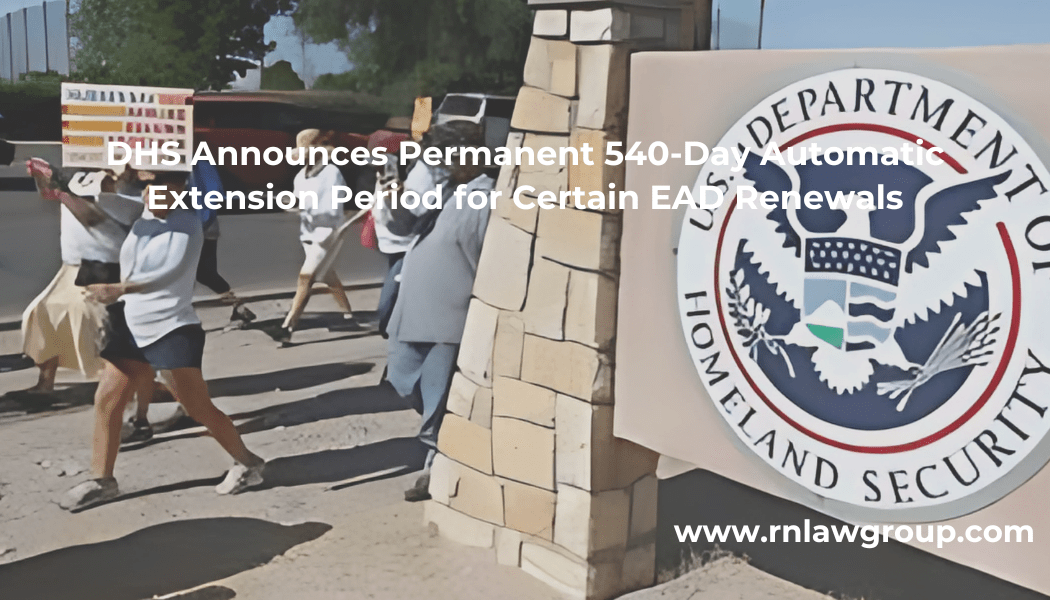
DHS Announces Permanent 540-Day Automatic Extension Period for Certain EAD Renewals
The Department of Homeland Security (DHS) has announced a final rule designed to support U.S. employers and improve access to Employment Authorization Documents (EAD) for eligible individuals. This rule permanently increases the automatic extension period for employment authorization and EADs from 180 days to 540 days for eligible noncitizens who file timely renewal requests. Following two temporary measures, DHS is finalizing the latest rule and making the extension permanent to prevent eligible EAD renewal applicants from facing lapses in employment authorization and/or EAD validity due to prolonged USCIS processing times.
This move responds to feedback from the business community advocating for greater certainty in the employment authorization processes.
Effective Date and Applicability
The final rule will take effect on January 13, 2025. It will apply to eligible applicants with pending or newly filed EAD renewal applications submitted on or after May 4, 2022.
Key Benefits of the Final Rule
The final rule aims to:
- Reduce Employment Authorization Lapses: By extending the automatic extension period, eligible noncitizens are less likely to face employment interruptions while awaiting the adjudication of their EAD renewal requests.
- Support Employers: Businesses can retain qualified workers and avoid disruptions caused by work authorization lapses.
- Promote Economic Growth: Ensuring continued employment for eligible individuals supports local economies and contributes to national economic stability.
USCIS Efforts to Improve EAD Processing
According to USCIS, the rule aligns with broader efforts by USCIS to enhance the efficiency of EAD processing, including:
- Cutting Median Processing Times: Median processing times for adjustment of status EAD applications have been reduced by half since FY 2021.
- Improving Application Support: USCIS has provided community outreach and on-the-ground intake support.
- Reducing Processing Times for Specific Categories: Asylum applicants and certain parolees now experience processing times of 30 days or less.
- Extending EAD Validity: The validity period for certain categories has been increased from two years to five years.
- Streamlining Refugee EAD Applications: Efforts have been made to simplify application processes for refugees.
- Expanding Online Filing: Online filing options for asylum applicants and parolees have been expanded.
Employer’s Form I-9 Considerations
Form I-9 compliance is critical for verifying the identity and employment authorization of all hired workers. Further, certain situations require employers to reverify work authorization of an existing employee. Therefore, employers must ensure compliance with Form I-9 requirements for both new and existing employees when utilizing the new 540-day automatic extension for employment authorization. Key considerations include:
- Verify Eligibility: If the individual presents an expired EAD, confirm that the employee’s EAD qualifies for the automatic extension by reviewing their EAD category and renewal receipt notice (Form I-797C). Eligibility categories are published on the USCIS Automatic EAD Extension page.
- Ensure proper completion of Form I-9: Ensure Section 1 and Section 2 are completely timely and properly.
- Track Expiration Dates: Monitor the 540-day extension period carefully. Before the extension period ends, reverify the employee’s work authorization to ensure continued employment eligibility.
- Train Staff: Educate HR personnel and managers about the updated rules, ensuring accurate and consistent implementation of Form I-9 procedures.
- Stay Updated: Regularly review updates to the USCIS Handbook for Employers (M-274) and the Automatic EAD Extension page for the latest guidance and clarifications.
By adhering to these directives, employers can effectively manage EAD extensions, minimize disruptions to their workforce, and remain compliant with federal employment verification requirements.
Conclusion
DHS’s final rule to extend the automatic renewal period for Employment Authorization Documents for certain applicants from 180 days to 540 days marks a significant step toward supporting U.S. employers, fostering economic growth, and reducing barriers for eligible noncitizens. By addressing the challenges of processing delays, this rule ensures greater stability for both workers and businesses.
By: Krystal Alanis
Krystal Alanis is a Partner at Reddy Neumann Brown PC and manages the firm’s PERM Labor Certification Department, where she oversees all EB-2 and EB-3 employment-based green card matters. Krystal guides clients from a variety of industries through the maze of the PERM Labor certification process and has handled thousands of PERM applications throughout her career with Reddy Neumann Brown PC. Krystal also guides employers and individuals through the I-140 and Adjustment of Status process, and assists clients with temporary work visa petitions (e.g., H-1B, TN, L-1, E-2). With over 12 years of immigration experience, Krystal is able to advise her clients with confidence and recognize any potential pitfalls that may arise.
